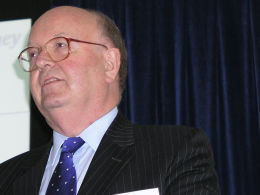Posted 7th December 2010 | 5 Comments
McNulty identifies rail savings of 'up to £1bn a year'

Sir Roy McNulty had already said that closures would be 'Plan B', and that he was working on 'Plan A', when he spoke to the Derby Rail Forum conference last month
A NEW report has suggested that the railway industry could be saving as much as £1 billion a year by working more effectively. The transport secretary has welcomed the interim findings of Sir Roy McNulty, who is carrying out a detailed investigation of the industry's costs.
The key will be closer co-operation, according to the transport secretary Philip Hammond, who said that train operators currently had no interest how much Network Rail was spending, because its funding has been solely a matter for government.
Mr Hammond, who said the savings could be achieved without any route closures, is now setting up a 'high-level' group, which he will chair, in order to bring about the necessary reforms.
The DfT said Sir Roy had found that the key to making the savings is ‘much closer working and alignment of incentives between train operators and Network Rail and strong leadership across the industry’.
The Department has also confirmed its plans to restructure rail franchising. Future contracts will be longer, more flexible and ‘more responsive to the needs of passengers while providing better value for taxpayers’.
Mr Hammond explained: “Incentives on the railway have become blurred and interests mis-aligned, to the detriment of efficiency, value for money and passenger satisfaction. At present Network Rail answers to its regulator, not to its customers, the train operators. Meanwhile, train operators have no interest in Network Rail’s costs, since any increases or decreases are passed straight through to the Government.
“This situation cannot be allowed to continue. All the players in the industry need to be pulling in the same direction in the interests of passengers and taxpayers. Sir Roy McNulty has pointed the way and I am establishing a high-level group, which I will chair, to drive reform. The Government is going to make significant investments in our railways in the coming years, but that support must be matched by a relentless drive for efficiency on the part of the industry.”
First reactions have been positive. The watchdog Passenger Focus welcomed Sir Roy's conclusions in principle, but said that the needs of passengers had to come first.
The chief executive of Passenger Focus Anthony Smith said: “Passengers will welcome pressure being put on the rail industry to reduce its costs and achieve maximum value for money from its business. Passengers mustn’t be expected to cover the cost of poor and inefficient planning, working practices and project management.
“Any change to industry structure and franchising must take into account passenger needs.”
Reader Comments:
Views expressed in submitted comments are that of the author, and not necessarily shared by Railnews.

H. Harvey, Birmingham
In principle to be more efficient must cut out waste and duplication by
Working more effectively
much closer working
alignment of incentives between train operators and Network Rail
strong leadership across the industry’.
Just one suggestion
Less duplication - reduce number of franchises to one
then merge franchise with network rail -
call the new organisation British Rail
Philip Russell, Carlisle, United Kingdom
Why has it taken this long to come to this ovious conclusion .The efficiencies promised at privitisation largely never materialised,instead we have had a group of train operators that gave the unions pretty much what they wanted ,whilst passing most of the extra costs onto the passanger and government ,yes we have a very safe and reliable railway weather permitting, but is it always necessary to pay ,for example a member of platform staff a job which takes a matter of months to learn ,the same or often more than say a mechanic or engineer in another industry which takes 3 or 4 years training. This attitude to costs will only assist rails competitors in the long term.
Garth, Chippenham
Let's hope they really get down to grass root changes. Here are a few 'brave' suggestions for starters!
1. Remove or minimise the obligation to pay TOCs for delay minutes caused by improvement work, less any necessary actual costs incurred.
2. Require TOCs and Network Rail to share the cost of replacement bus services, together with a penalty lump sum to be paid by NR and subsequently added to the investment pot for local improvements.
3. Reduce the overspend provision on investment schemes, and penalise late changes resulting in significant additional costs.
4. Substantially reduce the TRUST delay minutes provision; in effect, write off a significant proportion and reduce staff coverage.
5. Set up a working party to remove as many Rail Standards as practical, and as agreed with the industry regulator. In particular, allow Network Rail to manage civil engineering issues in-house without reference to “external” standards.
6. Streamline the GRIP process.
7. Make TOCs responsible for all signalboxes and thus for regulation issues, subject to protection for FOCs.
8. Relax the requirement for engineering blockages to be finalised so far in advance.
William Randle, Salisbury
It seems like utter insanity to me that route closures were even considered in the first place. What a joke.
Chris Reynell, Longstock, Hampshire.
When British Rail was broken up into over 100 companies, how much extra was spent trying to keep this lot working together?
There is much talk of restructuring the industry, could some of the main players be like the John Lewis Partnership - employees owning all or part of the company. Could this be applied to re-creating the big four companies which can have competition to and from the larger cities along different routes?
Another obvious saving would be to bring back mixed trains, long distance passenger trains carrying freight, parcels and mail; or is this now impossible?